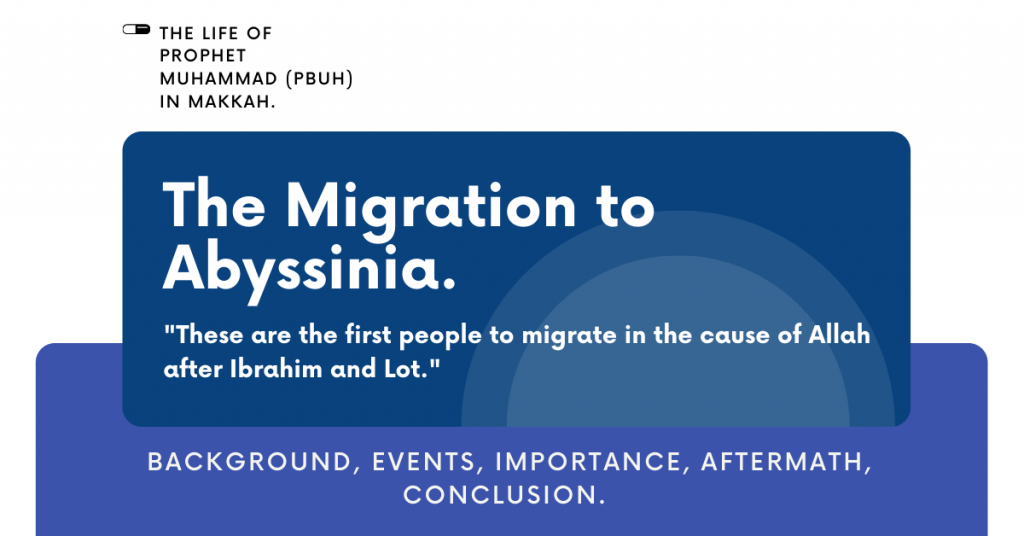
The migration to Abyssinia (Ethiopia) is a very important event in the history of Islam for several reasons.
The event has a background and it holds massive importance when it comes to the spread and rise of Islam in Arabia.
So, let’s get into the topic without any further introduction and discuss the background of this migration to Ethiopia.
The background:
When Prophet Muhammad (صلى الله عليه وسلم) came up with the message of Islam, he and his followers had to face massive opposition from the Quraish of Makkah.
Prophet Muhammad (صلى الله عليه وسلم) and his followers had to face persecutions and tortures. The Quraish saw the spread of Islam as their downfall and they were not ready to accept that Islam condemned their wrong practices.
Therefore, the Prophet Muhammad (صلى الله عليه وسلم) was tortured, abused and persecuted. His daughters, Ruqayya and Umm-e-Kulsoom, were divorced and he was portrayed as a poet or a magician.
The companions of the Prophet Muhammad (صلى الله عليه وسلم) were brutally beaten. Heavy stones were laid on their chests and they were forced to lay down on the scorching sand of the desert.
Related: Relationship Between Quran And Sunnah | Best Notes
These conditions were very difficult for Muslims. This was the time when Allah almighty commanded in the Holy Quran in Surah Zumar:
Good is for those who do good in this world and, God’s earth is spacious.
Surah Al-Zumar (39:10)
Thus, the Muslims were commanded to migrate in the cause of Allah to escape these persecutions and find a safe haven. The Prophet Muhammad (peace be upon him) said regarding these people:
These are the first people to migrate in the cause of Allah after Ibrahim and Lot.
Events of the migration to Abyssinia:
The Muslims secretly started to prepare to migrate to Abyssinia (Ethiopia) because the Prophet Muhammad (peace be upon him) was aware that the ruler of Abyssinia, Ashama (Negus), was a very kind and just ruler.
Therefore, a batch of 16 Muslims, 12 men and 4 women migrated to Abyssinia. Hazrat Usman (R.A) and Hazrat Ruqayya (daughter of Prophet Muhammad) were also among these migrants.
This was the first batch of the Muslims that migrated to Abyssinia for the cause of Islam and left behind their belongings, relatives and business.
Soon after this batch left Makkah, some verses of Surah Najm (Surah 53) were revealed unto the Prophet Muhammad (صلى الله عليه وسلم) who recited them to the Quraish of Makkah.
The people of Makkah were moved by the tone of the Quran and they bowed along with the Prophet Muhammad (صلى الله عليه وسلم) but they did not accept Islam.
However, a rumour reached Abyssinia that the people of Makkah had embraced Islam and that they could return back to Makkah. When the migrants returned, they were disappointed with the news.
Some of the people returned back while some stayed back in Makkah facing the persecutions by the Quraish.
Soon, a second batch migrated to Abyssinia. This batch comprised of 83 men and 19 women. When the Quraish of Makkah came across this development, they tried to stop the migrating people but they were out of their reach.

This was the time when influential Makkans such as Amr bin Aas and Abdullah bin Rabiyah decided to visit Negus with massive gifts in order to demand back Muslims from him.
When the Makkans reached the court of Negus, they presented him with massive bribes and asked him to return them the migrants. They complained that the migrating people forsake their religion for a new religion, Islam.
Negus summoned influential Muslim personalities. Some of them were:
- Hazrat Jafar bin Abi Talib
- Hazrat Usman bin Affan
- Hazrat Hamza (Prophet’s uncle)
Negus questioned Hazrat Jafar (رضي الله عنه) about his religion. He delivered a detailed speech that moved Negus. He said:
O, King! We were ignorant people; we worshipped idols, ate carrion and committed all sorts of injustices; brother wronged his brother and the strong exploited the weak.
Hazrat Jafar ibn Abi Talib further said that this was the time when a nobleman, Muhammad (صلى الله عليه وسلم), arose from amongst them. He ordered them to forsake idol worshipping and shedding unnecessary blood and help the poor and the weak people.
See: Compilation of the Quran GCE | 3 Interesting facts
He further said that Muhammad (صلى الله عليه وسلم) asked them to only worship one God, Allah almighty and do not set up partners with him.
After this, Hazrat Jafar (R.A) recited some verses of Surah Maryum:
And make mention of Mary when she withdrew from her people unto a place towards the east.
Surah Maryam (19:16)
After this speech, Negus asked the Makkans to return and he allowed Muslims to live for as long as they wished to live in Abyssinia (Ethiopia). The Makkans returned dishearted and dissatisfied.
The importance of migration to Abyssinia:
This event is very significant in the history of Islam for several reasons. Some of them are:
- After the migration, the Muslims were in a safe haven where they could live in peace and harmony.
- The Muslims had a chance to spread their religion.

This was because after travelling to Ethiopia, the people came across the teachings of Islam. This step introduced Islam to the people of Abyssinia.
- This migration provided the idea of a even bigger migration, the migration to Madinah in the future.
This was because when the Muslims were about to migrate to Madinah, they had an example of a previous migration that was very successful. The positive attitude of Negus and his people made Muslims determined to carry out their mission.
- The faith of the Muslims strengthened.
This was because the Muslims left all their belongings, family members and business back in Makkah in order to fulfil the command of the Prophet Muhammad (صلى الله عليه وسلم). This action motivated other Muslims to migrate as well and gradually, the conversions to Islam increased.
Also read: The Conquest of Makkah (8 A.H) | O Level Best Notes
- This was the first success of the Muslims against the Quraish.
The Quraish wanted the Muslims to return back to Makkah but after the positive response of Negus to the Muslims, the Quraish were dishearted. However, one negative effect is that the Quraish became more hostile to Muslims.
They carried out persecutions on an even greater level which strained the relations between the Quraish of Makkah and the Muslims.
Conclusion:
With this, the article regarding the migration of Abyssinia has come to and end.
I hope that all your questions have been answered and thank you for staying with me till the end.
The Holy Quran and the ahadith of the Prophet Muhammad (صلى الله عليه وسلم) elaborate on this incident which is a very significant event in the history of Islam.

